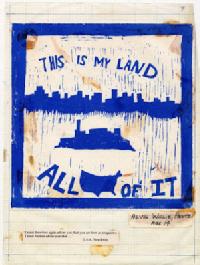In the Wake of Red Power Movements
Online conference (Zoom): In the Wake of Red Power Movements.
New Perspectives on Indigenous Intellectual and Narrative Traditions
Institute of Advanced Study, University of Warwick, May 14/15, 2021, 3.30 to 10 pm BST, 4.30 to 11 pm CEST
Registration at the bottom of this page (please scroll down). Registration closes May 12, 2021, 10 pm BST.
Convened by Dr. Doro Wiese, IAS, University of Warwick
Keynote speakers:
Dr. Mishuana Goeman
Professor of Gender Studies and American Indian Studies, UCLA
Dr. Robert Warrior
Distinguished Professor of American Literature & Culture, University of Kansas.
With a reading from award-winning writers Dr. Jeannette Armstrong and Lee Maracle, chaired by Dr. Deanna Reder.
Honors- and award-winning visual artist Adam Sings In The Timber will show and discuss some of his photographs.
Download booklet of the symposium's programme
This symposium explores North American Indigenous intellectual and narrative traditions that were recovered, reclaimed, or (re-)invented in the wake of Red Power movements that emerged in the 1960s in the settler colonial societies of Canada and the USA. It asks: which new perspectives and visions have been developed over the last 50 years within Indigenous studies and related fields when looking at Indigenous land and land rights, Indigenous political and social sovereignty, extractivism and environmental destruction, oppressive sex/gender systems, and for describing the repercussions of settler colonialism in North America, especially in narrative representations?
The symposium is guided by the idea that North American Indigenous intellectual and narrative traditions developed and recovered since the 1960s offer new and reclaimed ways of being, organizing, and thinking in the face of destruction, dispossession, and oppression; Indigenous ways of writing and righting are connected to ongoing social struggles for land rights, access to clean water, and intellectual and socio-political sovereignty; they are, as Maile Arvin, Eve Tuck, and Angie Morrill (2013) have pointed out, “a gift” from which most academic disciplines can benefit greatly.
In the face of ongoing exploitations of Indigenous knowledges and resources, it is paramount that researchers who focus on Indigenous intellectual and narrative traditions, especially those who come from settler-colonial backgrounds, carefully examine their implications in settler-colonial ways of dispossession. It is in this context that the symposium encourages self-reflectivity and invites participants from all positionalities to include reflections on how to act, think, and write in a non-appropriative manner about the intellectual achievements of Indigenous academics, activists, artists from North America. What kind of challenges does an engagement with Indigenous intellectual and narrative achievements from North America pose, and how do these achievements enable their audience to think differently and to develop visions that go beyond settler colonial hegemonies that make themselves felt in customs, laws, property-relations, or gender roles?
Possible topics include:
- North American Indigenous intellectual and narrative traditions that emerged or were rediscovered over the last 50 years;
- Indigenous representations of land and water, community-building, the other-than-human world;
- connections and frictions among and within different Indigenous traditions and/or settler societies in North America;
- Indigenous understandings of sex/gender;
- methodologies for reading across ethnic divides, alliance-building tools in academia and activism.
For any questions, please refer to the organizer Dr. Doro Wiese, IAS, University of Warwick.
Download this call for papers as a pdf.
This form is closed and is no longer accepting any submissions. Thank you for your time.

